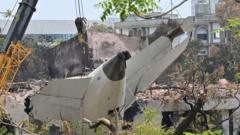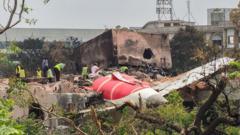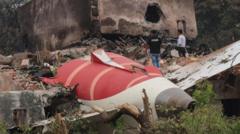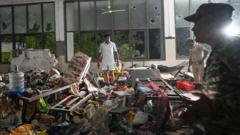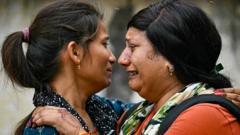In a surprising turn of events, Guinea's ruling junta has pardoned Moussa Dadis Camara, the former military ruler convicted last year for his role in the 2009 stadium massacre. The decree, announced via state television, cites health reasons for the decision, which comes less than a year into Camara's 20-year sentence for crimes against humanity. The public outcry surrounding this pardon is intensified by recent announcements from the current military government, which aims to compensate victims of the tragedy, a move some view as an attempt to distance itself from the actions of past regimes.
Pardon Granted to Guinea’s Ex-Military Ruler Amid Controversial Massacre Legacy

Pardon Granted to Guinea’s Ex-Military Ruler Amid Controversial Massacre Legacy
Former military leader Moussa Dadis Camara receives an unexpected pardon less than a year into his lengthy sentence for crimes against humanity related to the 2009 stadium massacre.
The 2009 massacre occurred when Guinean troops opened fire on peaceful protesters at a rally demanding a return to civilian rule, resulting in over 150 deaths and numerous instances of rape. Camara initially seized power in 2008 and faced scrutiny for his leadership, culminating in a 22-month trial that led to his conviction in 2024. The decision to grant a pardon raises questions about the implications for justice and accountability in Guinea, particularly given the unprecedented nature of the compensation plan announced for victims earlier this week.
Victims of the massacre are set to receive varying amounts based on the nature of their suffering, from significant compensation for rape victims to payments for loss of life and property. The rationale for Camara’s pardon reportedly relates to his health issues, although exact details have not been disclosed. This development, alongside Guinea's tumultuous political history—including the ousting of President Alpha Condé in 2021— underscores the ongoing struggle for justice and the challenges faced by military and civil authorities in addressing past atrocities.
With Camara's family expressing gratitude for his release, the broader ramifications for social healing and trust in governance remain uncertain, as Guinea grapples with its legacy of violence and calls for reconciliation.
The pardon not only reignites debates about accountability but also reflects the complex dynamics between military leaders and civil society in post-conflict contexts in Guinea and beyond.
Victims of the massacre are set to receive varying amounts based on the nature of their suffering, from significant compensation for rape victims to payments for loss of life and property. The rationale for Camara’s pardon reportedly relates to his health issues, although exact details have not been disclosed. This development, alongside Guinea's tumultuous political history—including the ousting of President Alpha Condé in 2021— underscores the ongoing struggle for justice and the challenges faced by military and civil authorities in addressing past atrocities.
With Camara's family expressing gratitude for his release, the broader ramifications for social healing and trust in governance remain uncertain, as Guinea grapples with its legacy of violence and calls for reconciliation.
The pardon not only reignites debates about accountability but also reflects the complex dynamics between military leaders and civil society in post-conflict contexts in Guinea and beyond.


